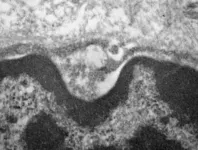Why men take more risks than women
2021-07-06
(Press-News.org) Researchers from HSE University and Max Planck Institute for Human Cognitive and Brain Sciences have discovered how the theta rhythm of the brain and the gender differences in attitudes to risk are linked. In an article published in the journal Frontiers in Neuroscience, the researchers addressed which processes can be explained by knowing this connection. https://www.frontiersin.org/articles/10.3389/fnins.2021.608699/full
By transmitting signals, the brain's neurons generate electromagnetic fields. The multiplicity of neurons makes these fields strong enough to be recorded on the surface of the head using magneto- and electroencephalography techniques. The resulting recording of the brain's electrical activity is divided into frequency bands -- brain rhythms, which are designated by Greek letters. We know for each one in which parts of the brain it is generated, in what state the person is in (e.g., at rest or during tasks) and what processes it may be associated with.
Existing research suggests that many differences in behaviour, including attitudes toward risk, can beat least partly explained by individual characteristics of brain activity. On average, women are known to take risks less frequently than men, and experiments have shown a correlation between willingness to take risks and differences in the strength of right and left frontal lobe theta rhythms (frontal theta asymmetry). However, these studies either included only or mostly women, and it remains unclear whether the asymmetry of theta rhythms actually contributes to gender differences in risk-taking.
The authors of the new article set three objectives:
The first was to determine whether there is a correlation between risk attitudes and frontal theta asymmetry in a sample with more or less equal numbers of male and female subjects.
The second was to test whether the combined strength of the theta rhythms of both frontal lobes is associated with behaviour under uncertainty (there is already evidence for this).
The third was to determine whether the neuronal oscillations generated in the anterior cingulate cortex (an area of the brain involved in error monitoring and possibly linked to gender differences in decision-making) correlate with risk-taking.
Thirty-five people took part in the experiment; of these, 15 participants were women. Each participant was asked to undergo a magnetoencephalography and three tests measuring risk-taking and impulsivity. The first test involved selecting a number of boxes (out of 100), each of which offered a monetary reward, but if one of the selected boxes contained a 'bomb', the participants lost all their earnings. Each participant was given 30 attempts. The second and third tests were questionnaires: the Barratt Impulsiveness Scale showed how a person assessed his or her own ability to plan and exhibit self-control, while the Domain-Speci?c Risk-Taking Scale (DOSPERT) showed how willingly a person agreed to a particular risk-taking action and how he or she assessed the possible gains and losses arising from it.
In the boxes test, men showed a higher risk appetite than women (an average of 48 boxes opened versus 40; participants chose fewer boxes on their first try -- 44 and 31 out of 100, respectively). Of the questionnaires, only the DOSPERT Benefits scale yielded a similar result (men are more optimistic about the positive outcome of a risky venture); the other tests showed no gender differences. The frontal theta asymmetry was not significantly related to the number of boxes selected in the sample -- a positive correlation was evident only among women. The strength of the frontal theta rhythms (and especially the oscillations localized in the anterior cingulate cortex) correlated with results of the game, as well as with subjective assessments of benefits and losses from risky behaviours.
Thus, the researchers suggest that individual variability in the strength of theta rhythms in the anterior cingulate cortex is related to gender differences in assessing the consequences of risky actions and, consequently, attitudes toward risk. It is likely that both the activity of this brain region and risk-taking are influenced by hormone levels such as testosterone.
'Gender differences in weighing of the potential consequences of decisions may not only affect risk-taking, but also reflect a more fundamental process of emotional responsiveness to environmental stimuli. We speculate that such differences related to hormonal regulation may also influence the prevalence of depression, anxiety and other clinical conditions among women, and we will continue to explore this topic,' concluded Maria Azanova, the lead author of the article.
INFORMATION:
ELSE PRESS RELEASES FROM THIS DATE:
2021-07-06
The future of cod stocks in the North Sea and the Barents Sea may be much easier to predict than before. This is the result of an international research project led by the Helmholtz-Zentrum Hereon and its Institute of Coastal Systems - Analysis and Modeling. For the first time, the team has succeeded in predicting the development of stocks for ten years in advance, taking into account both changes due to climate and fishing. Traditionally, fisheries experts provide catch recommendations for about a year in advance, on the basis of which fishing quotas are negotiated and set internationally. This involves first estimating the size of current cod stocks and then calculating how much cod can be caught in the coming year without endangering the stocks ...
2021-07-06
Climate change is causing increased flooding and prolonged waterlogging in northern Europe, but also in many other parts of the world. This can damage meadow grasses, field crops or other plants - their leaves die, the roots rot.
The damage is caused by a lack of oxygen and the accumulation of acids. How do plants perceive this over-acidification, how do they react to it? This is what researchers from Würzburg, Jena (Germany) and Talca (Chile) describe in the journal Current Biology.
Biophysicists Dr. Tobias Maierhofer and Professor Rainer Hedrich from the Chair of Molecular Plant Physiology and Biophysics at Julius-Maximilians-Universität ...
2021-07-06
For the first time, University of Basel researchers have equipped an ultrathin semiconductor with superconducting contacts. These extremely thin materials with novel electronic and optical properties could pave the way for previously unimagined applications. Combined with superconductors, they are expected to give rise to new quantum phenomena and find use in quantum technology.
Whether in smartphones, televisions or building technology, semiconductors play a central role in electronics and therefore in our everyday lives. In contrast to metals, it is possible to adjust their electrical conductivity by applying a voltage and hence to switch the current flow on and off.
With a view to future applications in electronics and quantum technology, researchers are focusing on the development ...
2021-07-06
Abu Dhabi, UAE, July 5, 2021: NYU Abu Dhabi (NYUAD) researchers uncovered a code that sets the genome of the liver to account for the remarkable ability for this organ to regenerate. This finding offers new insight into how the specific genes that promote regeneration can be activated when part of the liver is removed. These findings have the potential to inform the development of a new form of regenerative medicine that could help non-regenerative organs regrow in mice and humans.
While other animals can regenerate most organs, humans, mice, and other mammals can only regenerate their liver in response to an injury or when a piece is removed. NYUAD researchers ...
2021-07-06
Post-traumatic stress disorder (PTSD) rings a bell for many, due to its rampant references in pop culture, and more, importantly, its prevalence in today's society. It is only probable that this disorder, which develops after shocking or dangerous events, would unfortunately affect the lives of many people. Medical researchers have been hard at work trying to come up with solutions to combat this condition and its manifestations effectively. Unfortunately, the neurological mechanisms of PTSD aren't clear, and without knowing this exactly, trying to find a cure is a shot in the dark.
Fortunately, a group ...
2021-07-06
"Plant a hundred kinds of crops"
Wangjinzhuang village is nestled amongst the steep slopes of the South Taihang Mountains in Hebei Province, China. To prosper in the northern climate, the villagers have developed a tried-and-true strategy: "using the land to plant a hundred kinds of crops and not rely on the sky". Their fields contain red millet, white sorghum, purple and green eyebrow beans, and yellow radishes. Having survived for over a thousand years, this agrobiodiversity is a vibrant cornerstone of the village's agricultural heritage that is too precious to lose.
In an effort to combat dwindling crop diversity across China (the Ministry of Agriculture found that of 11,590 grain crop varieties planted ...
2021-07-06
Cardiovascular drugs do not affect COVID-19 outcomes--such as disease severity, hospitalizations, or deaths--according to an analysis of all relevant studies published as of November 2020. The findings are published in the END ...
2021-07-06
BOSTON - Significant amounts of atherosclerotic plaque have been found in the coronary arteries of people with HIV, even in those considered by traditional measures to be at low-to-moderate risk of future heart disease, according to a study published in JAMA Network Open.
This finding emerged from the global REPRIEVE (Randomized Trial to Prevent Vascular Events in HIV) study, in which Massachusetts General Hospital (MGH) is playing a key coordinating role. Researchers found that the higher-than-expected levels of plaque could not be attributed simply to traditional cardiovascular disease risk factors like smoking, hypertension, and lipids in the blood, but were independently related to increased arterial inflammation ...
2021-07-06
The expected decline in the number of landfills across the United States coupled with bans on disposing large amounts of organic waste in landfills that have been enacted in multiple states has prompted researchers at the U.S. Department of Energy's (DOE's) National Renewable Energy Laboratory (NREL) to examine other ways to grapple with the issue of food waste disposal.
The researchers determined no single solution exists in the United States for dealing with food waste disposal. NREL researchers Alex Badgett and Anelia Milbrandt came to that conclusion after examining the economics involved in five different ways to ...
2021-07-06
In Brazil, researchers at the University of São Paulo’s Medical School (FM-USP) have discovered that SARS-CoV-2 infects and replicates in the salivary glands.
Analysis of samples from three types of salivary gland obtained during a minimally invasive autopsy procedure performed on patients who died from complications of COVID-19 at Hospital das Clínicas, FM-USP’s hospital complex, showed that tissues specializing in producing and secreting saliva serve as reservoirs for the novel coronavirus.
The study was supported by FAPESP and reported in an article published in the Journal of Pathology.
The researchers said the discovery ...
LAST 30 PRESS RELEASES:
[Press-News.org] Why men take more risks than women




